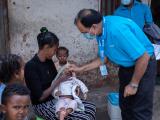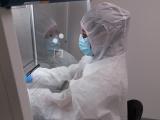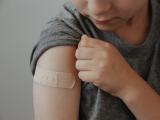Dec 19, 2011
Longitudinal study confirms safety of anthrax vaccine in UK military
Uptake of anthrax vaccine has dropped in UK military personnel in recent years despite data showing long-term safety, British researchers reported in Vaccine. They also found that those who weren't fully informed about the safety profile of the vaccine reported the highest rate of poor health post-vaccination. The group collected data from June 2007 through November 2009 on two groups of UK military members: 3,206 who had been offered anthrax vaccination before they were deployed to Iraq in 2003, and 1,190 who were offered the vaccine as part of later deployments. Participants rated their post-vaccination health in four categories: self-rated health, physical symptoms, mental health assessment, and symptoms of post-traumatic stress disorder. The investigators found no long-term health problems in volunteers after anthrax vaccination, a finding that mirrored the results of an earlier study they conducted using
the same four criteria for 2003 through 2005. They found, however, that uptake in the more recently vaccinated soldiers was 14%, compared with 72% in those vaccinated in 2003. They also found that those who had the lowest scores on health were least informed about the vaccine, a finding that also echoed results of the earlier study. The authors emphasize that the "mechanism for this relationship is unknown" but surmise that it may be due to anxiety related to false reports of vaccine side effects. The authors conclude, "Both civilian and military personnel who are offered the anthrax vaccination in the future can be reassured about its safety. However, it is also important to emphasise and respect choice if the risk of symptomatic side effects is to be avoided."
Dec 16 Vaccine abstract
Hospital bath basins commonly contaminated with drug-resistant pathogens
Hospital bath basinsthose portable, rectangular plastic bins used in hospital roomsare often contaminated with common pathogens, many of which are drug-resistant, according to researchers from Wayne State University in Detroit. They swabbed 1,103 basins from 88 US and Canadian hospitals during a 44-month study published today in the American Journal of Infection Control. The basins were from regular wards, medical-surgical wards, and intensive care units. They were rinsed with tap water and soap between uses, per infection-control guidelines, and not disinfected, but no basins were shared between patients. Of the basins tested, 686 (62%) were contaminated with at least one of the three pathogen tested for: 39% with one, 22% with two, and 2% with all three. Gram-negative bacilli were the most commonly isolated, with 495 (45%) positive basins, followed by enterococci (414, 35%) and Staphylococcus
aureus (40, 3.6%). All hospitals had contaminated bath basins. Of the enterococci, 385 (93%) were vancomycin resistant, and of the S aureus, 36 (90%) were methicillin resistant. The authors conclude, "The use of basins should be limited to the extent possible, to eliminate a potentially hazardous environmental reservoir for serious nosocomial pathogens." They also comment on a common practice: "Medical equipment and supplies should not be stored in basins."
Dec 19 Am J Infect Control abstract
Unused restroom paper towels may also harbor harmful bacteria
Canadian researchers found that unused paper towels in restrooms can harbor potentially harmful bacteria and that bacteria can be passed on to hands or hospital gloves after hand washing, according to another study today in the same journal. The scientists tested six brands of restroom-quality paper towels and found bacteria of the Bacillus genus to be the most abundant microorganisms detected, on 83% of towels, followed by Paenibacillus (16%), Exiguobacterium (1.6%), and Clostridium (0.01%). They also found that paper towels made from recycled fibers harbored 100- to 1,000-fold more bacteria than those made from virgin wood. In addition, they found the bacteria were "easily transferred" to nitrile gloves after hand washing but not through airborne routes. They write, "This study demonstrates that a diverse community of culturable bacteria contaminates unused paper towels and that some of these
bacterial strains may be toxin producers."
Dec 19 Am J Infect Control abstract
Pakistan reports 6 new polio cases
Pakistan last week confirmed six new polio cases, bringing the country's yearly total to 173, according to Central Asia Online. Dr. Altaf Bosan, head of the prime minister's Polio Eradication Cell, said that four of the cases are in Balochistan and one each in Khyber Pakhtunkhwa and Frontier Region Kohat. Last month US officials confirmed 120 polio cases in Pakistan through September, according to a summary in Morbidity and Mortality Weekly Report (MMWR). Media reports have linked the increase in polio cases to a campaign by the Taliban to prevent parents from having their children immunized, saying it's a plot by Westerners to sterilize Muslims, according to Central Asia Online.
Dec 15 Central Asia Online story
Nov 11 MMWR report


















